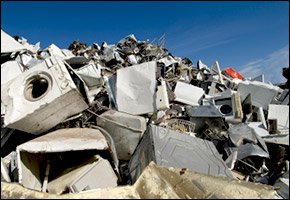The Economics of Water Quality Need Greater Emphasis, UN Experts Say
Waste water treatment costs and ecosystem services are often not properly accounted for.
Brett Walton
Circle of Blue
NAIROBI, KENYA —The costs for building water supply systems should include the expense to treat the waste water, according to several experts at a conference on water quality hosted by the United Nations Environmental Program (UNEP) in conjunction with World Water Day.

The 24-hour event is one of several periodic high-level gatherings held to draw attention to the role that freshwater plays in the world.
“Even if you declare water a human right, there should be someone footing the bill for the service,” said Dr. Janos Bogardi from the United Nations University. “We may not have to pay for water but we have to pay for the service, for cleaning it, for disposing of it.”
David Osborn from the UNEP compared the lack of investment in waste water treatment to a family not washing its dishes after eating and letting them pile up on the counter.
“Dinner is not really finished until the dishes are cleaned and put back in the cupboard,” he said. “The cost of treating waste water should be captured in the cost to provide water.”
Poor water quality is a global problem. Raw sewage and industrial and agricultural waste pollute water bodies everywhere people live. Waterborne diseases such as diarrhea are the number one killer of children under age five, and more than one-third of all people do not have adequate sanitation.
The water quality situation in countries with widespread waste water treatment stands in stark contrast. Water from rivers is used multiple times in its journey from highlands to the sea, but the treated waste water is often a higher quality than when it was withdrawn.
Osborn estimates that every glass of water a Londoner drinks has been through eight other stomachs – though treatment removes the chemicals and waterborne diseases that kill millions in developing countries every year.
Yet, expensive treatment plants are not the only solution.
The Economics of Ecosystems and Biodiversity project (TEEB) is a UNEP program to study the economic benefits of a healthy ecosystem. Restoring environmental quality has proved to be one of the cheapest ways to improving water quality.
Pavan Sukdhev, TEEB project leader, pointed to a case study from India. Evian and Vittel, both bottled water companies, saw the water quality at their Indian bottling plants decline from excessive agricultural runoff upstream.
The two companies decided to pay farmers for better management of the upstream ecosystem. They struck long-term agreements with farmers so that they used organic pesticides in order not to pollute the water supply, Sukdhev said. The farmers were paid a certain amount of money per hectare to offset the higher cost of organic pesticides.
New York City took a similar approach two decades ago with its drinking water supply system. To comply with Clean Water Act regulations, the city was forced to improve its water quality. Rather than build the $8 billion treatment plants, officials initiated a watershed restoration program.
The city purchased land in the upper reaches of the watershed and worked with farmers to reduce agricultural waste. New York met its water quality targets, spending less than $1 billion on land acquisition and better management practices.
— Dr. Janos Bogardi, United Nations University
These benefits are often overlooked because they are not traded in markets. This is forcing environmental policy experts to find better ways to account for the services ecosystems provide. Sukdhev’s TEEB project is a part of the UNEP’s Green Economy Initiative, which is trying to understand the economic benefits of items included in GDP figures, such as ecosystem services.
The results from the India case study show that a healthy ecosystem is a significant asset.
Restoring freshwater quality in the most polluted states in India costs over one-sixth of what the state earns, Sukdhev said.
But just because these services are not market-based, does not mean they are free, according to Sukdhev.
“If you don’t reward the services you receive, the supplier will stop them,” he said.
Brett writes about agriculture, energy, infrastructure, and the politics and economics of water in the United States. He also writes the Federal Water Tap, Circle of Blue’s weekly digest of U.S. government water news. He is the winner of two Society of Environmental Journalists reporting awards, one of the top honors in American environmental journalism: first place for explanatory reporting for a series on septic system pollution in the United States(2016) and third place for beat reporting in a small market (2014). He received the Sierra Club’s Distinguished Service Award in 2018. Brett lives in Seattle, where he hikes the mountains and bakes pies. Contact Brett Walton









Leave a Reply
Want to join the discussion?Feel free to contribute!